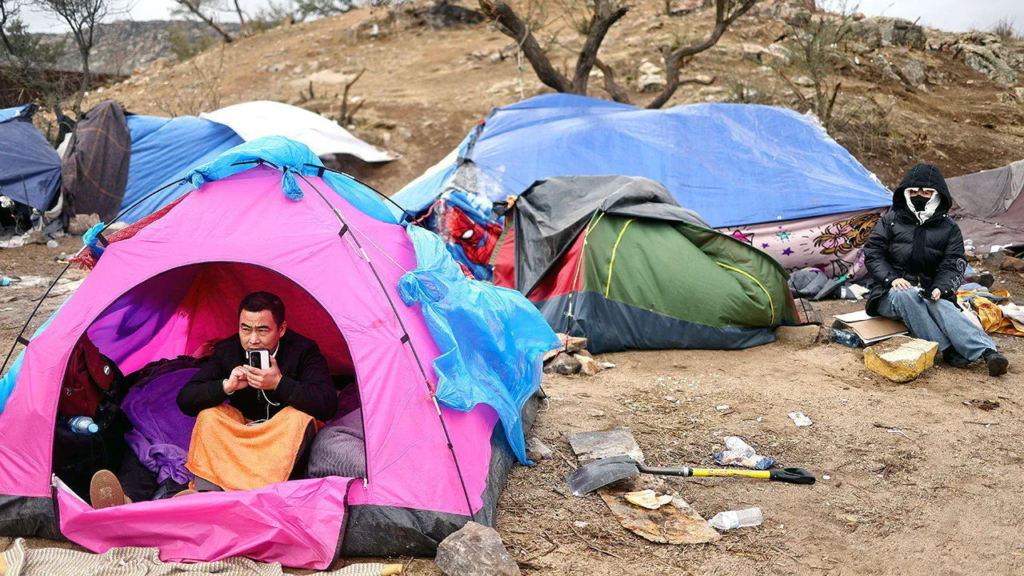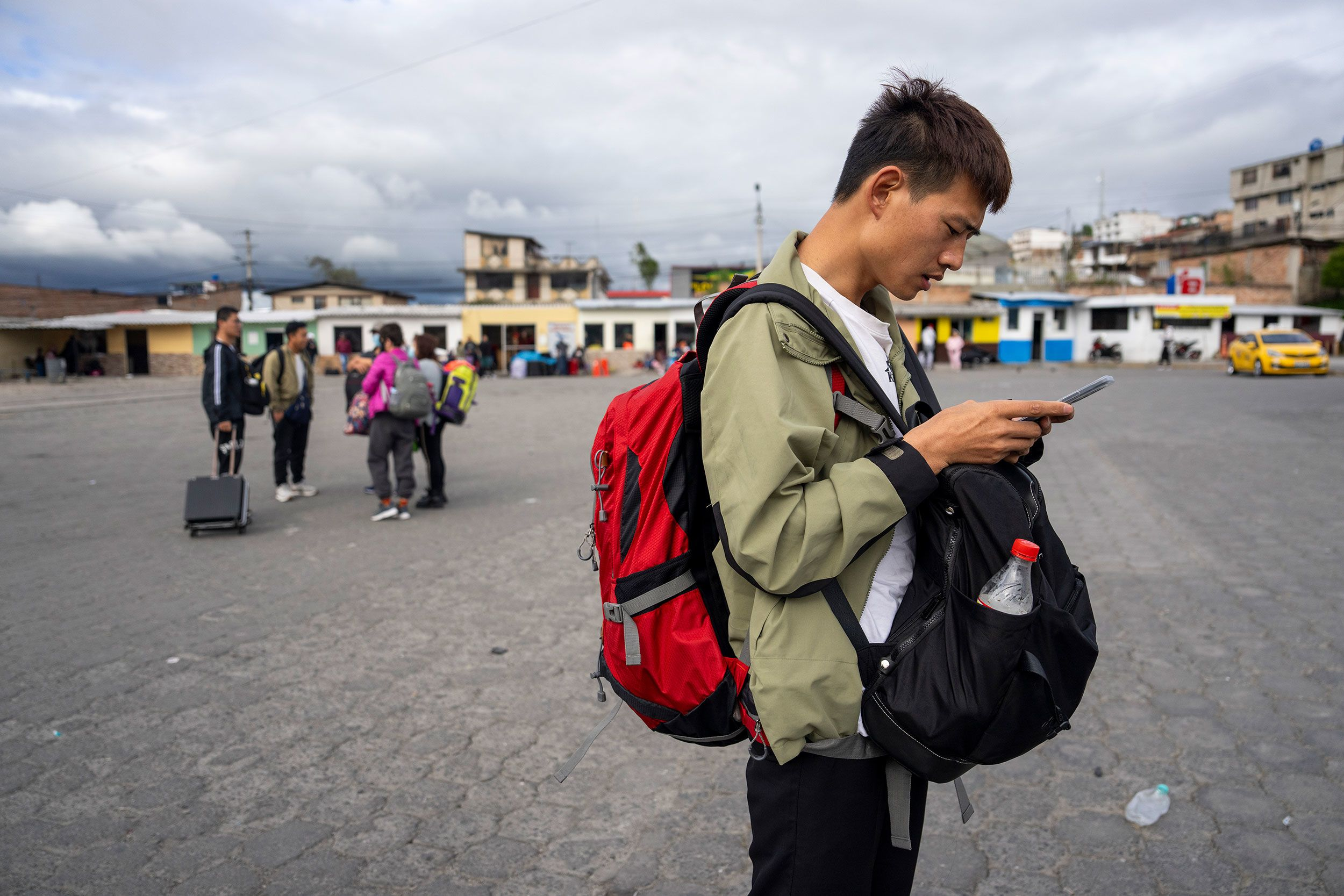In an effort to curb undocumented migration and cooperate with Beijing, the United States has taken significant steps to repatriate Chinese migrants entering the country illegally. For the second time in four months, a flight carrying undocumented Chinese nationals was sent back to China, signaling increased collaboration between Washington and Beijing on immigration issues.
The latest deportation comes at a time when immigration and border security are hotly debated topics, especially in the lead-up to the U.S. presidential election.
As Vice President Kamala Harris and former President Donald Trump gear up for their showdown, both immigration policy and the handling of illegal migrants are expected to take center stage in political discussions.
The ongoing issue of Chinese migration into the United States highlights a broader immigration crisis at the southern border and raises questions about international cooperation on immigration enforcement.
As the U.S. works to handle the influx of migrants crossing its borders, it has engaged with other nations, including China, to address illegal immigration and ensure the swift removal of individuals without legal grounds to remain in the country.
A Renewed Focus on Chinese Migrants: The Second Repatriation Flight
On Thursday, the U.S. Department of Homeland Security (DHS) confirmed that it had sent another flight of undocumented Chinese migrants back to China, marking the second such flight in just four months.
While details surrounding the flight, such as the number of deportees and the specific destinations, remain undisclosed, the move demonstrates the U.S.’s growing focus on addressing illegal immigration, particularly as the presidential election draws near.
The first flight of Chinese migrants took place in July 2023, the first of its kind since 2018. At that time, the DHS coordinated closely with China’s National Immigration Administration to ensure the successful repatriation of 116 Chinese nationals.
Read : Grand Egyptian Museum is Partially Open for Visitors After 20 Years
This marked a resumption of U.S.-China cooperation on migration issues, which had been disrupted in the years prior. Since then, both countries have worked to maintain open channels of communication and cooperation, as reflected by the second deportation flight in October.
Homeland Security Secretary Alejandro Mayorkas emphasized the importance of enforcing immigration laws and preventing the spread of misinformation by smugglers. He warned potential migrants that individuals without a legal basis to remain in the U.S. would be subject to swift removal.
Read : Russia Formally Declares the US as an “Enemy” State
His statement came amid a broader push to deter illegal immigration and strengthen border security, both of which have become key points of contention in the U.S. political landscape.
The timing of these deportation efforts is significant, as they come just weeks before the 2024 U.S. presidential election. Immigration is one of the core issues dominating the political debate, with both Harris and Trump offering contrasting views on how to address the border crisis and manage the influx of migrants.
As the number of undocumented Chinese migrants continues to rise, the U.S.’s approach to handling their repatriation could become a critical factor in shaping public opinion and electoral outcomes.
The U.S.-China Repatriation Agreement: A New Era of Cooperation?
The second deportation flight of Chinese nationals reflects a growing willingness on both sides to work together on immigration enforcement. Earlier this year, Beijing and Washington resumed cooperation over migration issues, signaling a shift in their relationship on this front.
In May, the Chinese embassy in Washington released a statement asserting that Beijing “firmly opposed all forms of illegal immigration” and expressed openness to working with the U.S. on repatriating illegal immigrants. This marked a turning point in U.S.-China relations, which had been strained over other geopolitical issues but showed signs of convergence on migration.
The DHS’s efforts to deport Chinese migrants are part of a broader strategy to address illegal immigration at the U.S. southern border. In July 2023, the first flight of Chinese nationals was repatriated as part of a coordinated operation between the U.S. and China.
At the time, this move was seen as a significant milestone, marking the first such deportation flight since 2018. The DHS later confirmed that the flight carried 116 Chinese nationals, underscoring the scale of the operation.
In the months that followed, U.S.-China cooperation on migration enforcement continued to develop. According to the DHS, nearly 400 international repatriation flights were operated between May and August 2023, deporting individuals to more than 140 countries, including China.
This level of collaboration suggests that both Washington and Beijing are committed to addressing the challenges posed by cross-border illegal activities, including smuggling and unauthorized migration.

China’s National Immigration Administration echoed these sentiments, stating that it had made “positive progress” in working with other countries, including the U.S., to crack down on smuggling and other illegal activities. The agency emphasized that China would continue to strengthen international immigration law enforcement cooperation, suggesting that the two countries may continue to collaborate on future deportation efforts.
This renewed partnership comes at a time when both nations are facing significant challenges related to migration. For the U.S., the ongoing surge of migrants crossing the southern border, including Chinese nationals, has exacerbated an already strained immigration system.
According to U.S. Customs and Border Protection, more than 21,000 Chinese nationals were apprehended at the southern border between January and August 2023. This figure represents a significant increase from the previous year, when a total of 24,278 Chinese nationals were apprehended over the course of 12 months.
The rising number of Chinese migrants entering the U.S. through the southern border can be attributed to various factors, including economic challenges in China and the perception of better opportunities in the U.S. The lifting of COVID-19 restrictions in China may have also contributed to the increase in migration, as it allowed individuals greater freedom to travel abroad.
However, as the U.S. presidential election approaches, immigration and border security are likely to remain central to the political discourse, and the handling of Chinese migrants could influence voter sentiment.
Immigration as a Political Flashpoint: The Road to the 2024 Election
As the U.S. presidential election nears, immigration has once again emerged as a defining issue, with candidates offering contrasting visions for how to address the ongoing border crisis. Vice President Kamala Harris and former President Donald Trump are both vying for the presidency, and their approaches to immigration policy have been central to their campaigns.
For the Biden administration, the focus has been on a combination of enforcement and reform. In June 2023, President Joe Biden issued a proclamation temporarily suspending the entry of certain migrants unlawfully crossing the southern border and limiting their eligibility for asylum.
This move was part of a broader effort to crack down on illegal immigration and address the surge of migrants at the U.S.-Mexico border.
In the months following Biden’s proclamation, the DHS ramped up its efforts to enforce immigration laws and deport individuals without legal status. By the end of August, nearly 400 repatriation flights had been operated to countries around the world, including China.
The deportation of Chinese migrants, in particular, has become a focal point of these efforts, as the U.S. seeks to demonstrate its commitment to border security and international cooperation.

Homeland Security Secretary Mayorkas has repeatedly emphasized the importance of enforcing immigration laws and preventing smuggling networks from exploiting vulnerable migrants. His warnings to potential migrants – particularly Chinese nationals – reflect the administration’s efforts to deter illegal crossings and ensure that those without legal grounds to remain in the U.S. are swiftly deported.
However, the Biden administration’s approach to immigration has faced criticism from both sides of the political spectrum. On one hand, progressives argue that the administration has not done enough to protect migrants and offer pathways to legal residency.
On the other hand, conservatives, led by Donald Trump, have called for even stricter enforcement measures and more aggressive border security policies.
Trump, who made immigration a central issue during his previous campaigns, has vowed to take a hardline approach to border security if re-elected. He has repeatedly criticized the Biden administration for its handling of the border crisis, arguing that the surge of migrants entering the U.S. poses a threat to national security.
Trump’s proposals include building more sections of the border wall and increasing the number of deportations, particularly of migrants from countries like China and Mexico.
As the presidential race heats up, immigration is expected to remain a contentious issue. The deportation of Chinese migrants is likely to play a role in shaping public opinion, particularly among voters concerned about border security.
While the Biden administration has demonstrated its commitment to enforcing immigration laws through the repatriation of migrants, Trump’s hardline stance could resonate with voters who feel that more needs to be done to address the crisis.
The upcoming election will serve as a referendum on U.S. immigration policy, and the handling of undocumented migrants – including Chinese nationals – will likely be a key factor in determining the outcome. With both candidates offering starkly different approaches, the issue of immigration is poised to be one of the defining issues of the 2024 presidential race.
The U.S.’s decision to deport illegal Chinese migrants for the second time in four months underscores the growing cooperation between Washington and Beijing on immigration enforcement.

As the number of Chinese nationals entering the U.S. through the southern border continues to rise, the U.S. government has ramped up its efforts to repatriate individuals without legal status. The deportation of Chinese migrants has also taken on increased political significance, as immigration and border security become central issues in the upcoming U.S. presidential election.
With both Vice President Kamala Harris and former President Donald Trump presenting contrasting visions for how to address the border crisis, the handling of undocumented migrants – particularly those from China – will likely influence voter sentiment and shape the future of U.S. immigration policy.
As the U.S. and China continue to cooperate on migration enforcement, the deportation of Chinese nationals may become a recurring feature of the U.S.’s broader strategy to address illegal immigration and uphold its immigration laws.

